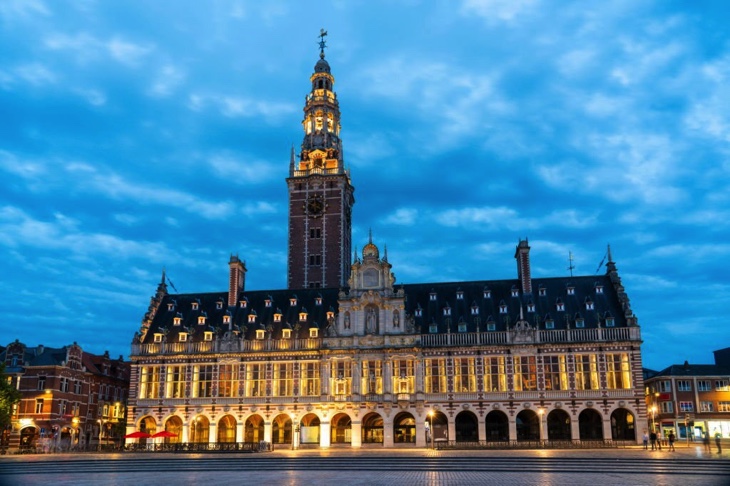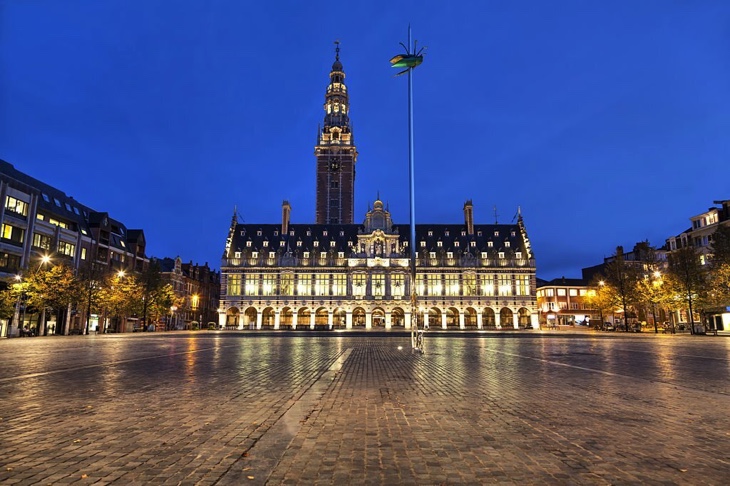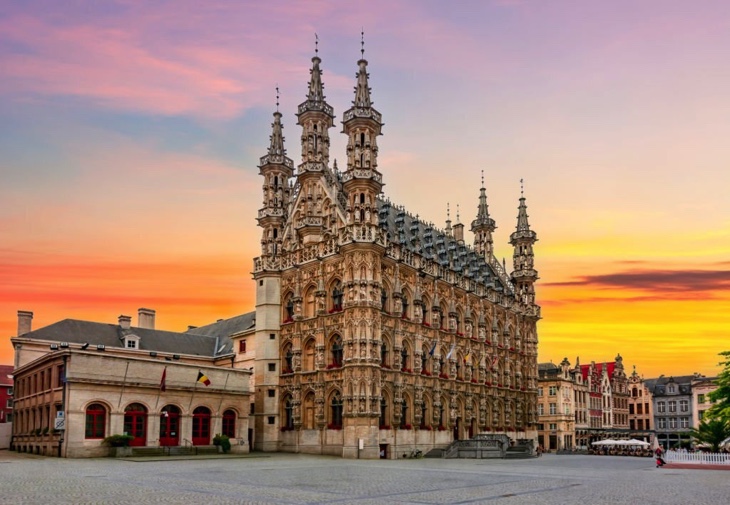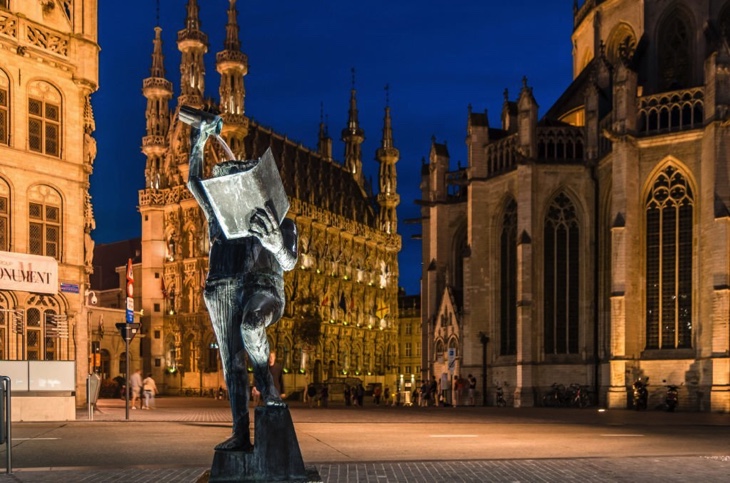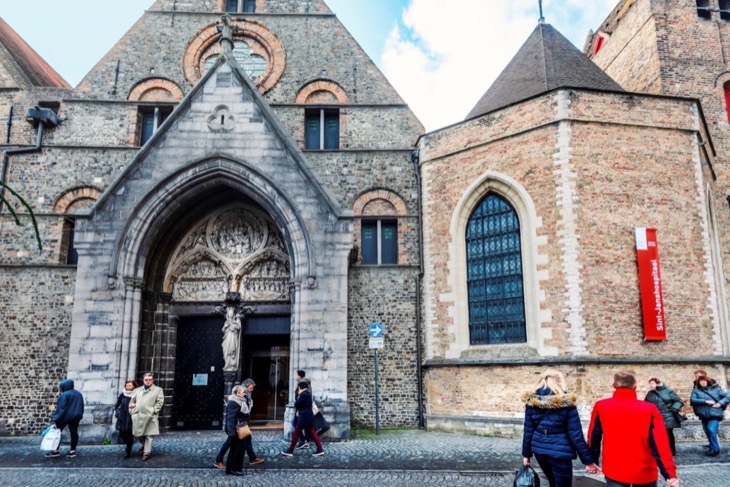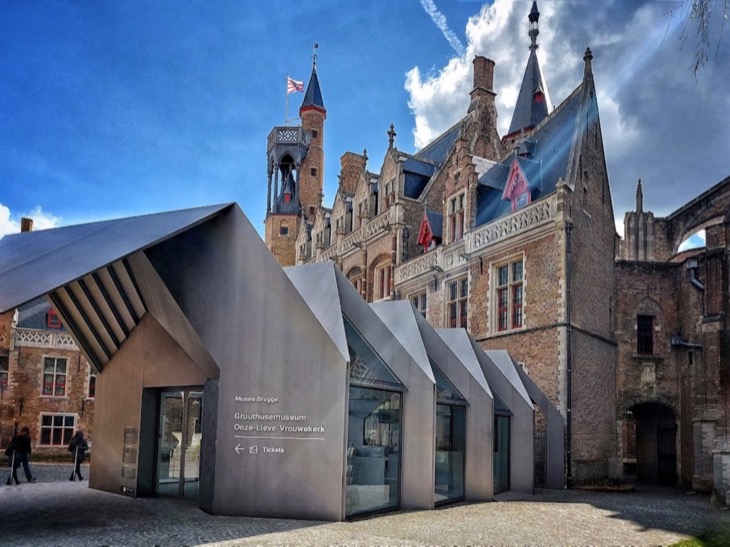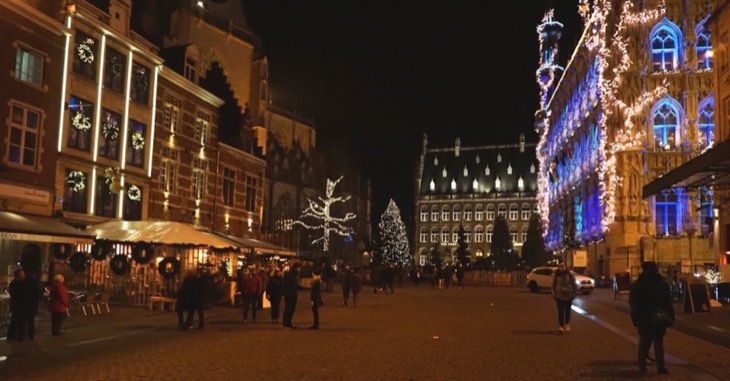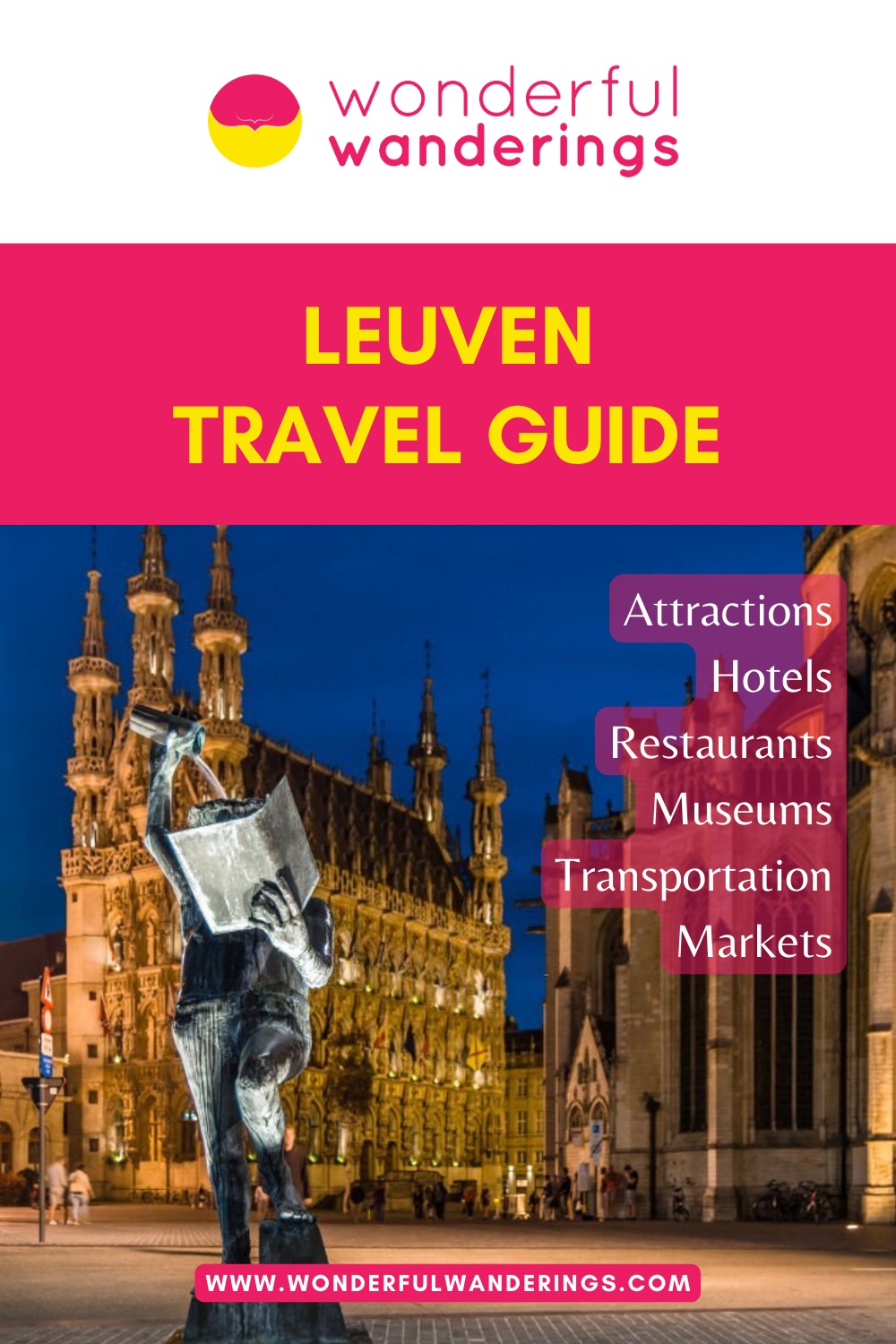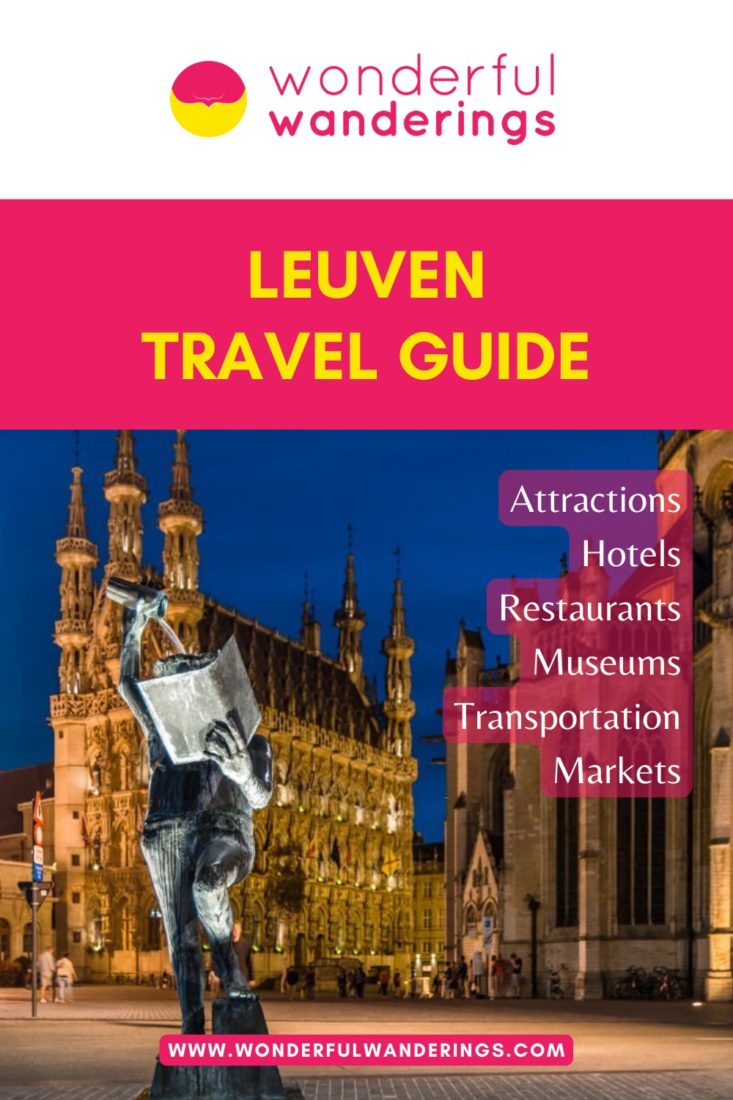Leuven is located 30 kilometers (18.6 miles) east of Brussels in the Flemish region of Belgium. It has a population of 100,000 and is home to the Catholic University of Leuven, Belgium’s oldest university founded in 1425. Leuven has an important history as a prosperous medieval cloth town, though it suffered damage in wars over the centuries. Historic landmarks like the 15th-century Town Hall, 12th-century St. Peter’s Church, and the university’s library demonstrate Leuven’s architectural heritage. Leuven combines historic charm with modern suburbs and redevelopment.
The primary language in Leuven is Dutch, specifically the Flemish dialect. French is also spoken as Belgium’s second official language. Key attractions include the Gothic Leuven Town Hall, Botanical Gardens, shopping areas, St. Peter’s Church, and the Stella Artois brewery tour. Leuven hosts events like a Christmas market. The city center is walkable and accessible by public transport like frequent local buses and trains to Brussels in 20-25 minutes.
Contents
- Where is Leuven?
- What is the history of Leuven?
- What are the best things to do in Leuven?
- Are Christmas markets crowded in Leuven?
Leuven offers Belgian cuisine like stews, seafood, waffles, frites, chocolate, and beer from its many cafés, bars and restaurants. Highly rated options include Taste, Raffat, EssenCiel, Den Angelus, and Dewerf. Leuven has a mix of modern and historic hotels. Top areas to stay are the central city, Ladeuze, Vaartkom and Heverlee.
Leuven has a mild, temperate climate influenced by the nearby North Sea. Its small-town vibe, youthful energy as a university city, charming historic streets, and architectural treasures make Leuven a worthwhile Belgian destination. Winters are cool with average temperatures around 3°C (37°F). Summers are warm with highs around 20-25°C (68-77°F).
Where is Leuven?
Leuven is located in the Flemish region of Belgium, 30 km (18.6 miles) east of Brussels. It is in the province of Flemish Brabant, which is the capital. Leuven has a population of 100,000 residents and is considered one of Belgium’s smaller cities. However, it has an outsized influence as it is home to Belgium’s largest and oldest university, the Catholic University of Leuven, founded in 1425. Leuven is located on the Dijle River and contains fine examples of architecture dating back to its period as a prosperous historical cloth town. Landmarks like the 15th-century Town Hall, 12th-century St. Peter’s Church and the iconic university library demonstrate Leuven’s rich architectural heritage. Leuven has expanded beyond the compact old town to incorporate 20th-century suburbs and a redeveloped industrial port area. Leuven combines historic charm, vibrant student life, thriving industries and Flemish culture. Leuven is just a short train ride from Brussels.
What is the history of Leuven?
Leuven has a long history dating back to the 9th century AD when a settlement sprang up along the Dijle River. Its strategic location helped Leuven become an important commercial centre specialising in the cloth trade during the Middle Ages. Prosperity from the textile guilds enabled the city to fund architectural marvels like the St. Peter’s Church and extravagant Town Hall during the 14th and 15th centuries. As home to the known University of Leuven, founded in 1425, Leuven became an influential centre of Catholic theology and humanist thought. However, Leuven was ravaged by war and destruction numerous times over the centuries. It was besieged, looted and partly burnt during wars in the 16th and 17th centuries. In 1914, the German army severely damaged the city at the outset of World War One. But thanks to its prosperous past, Leuven was able to rebuild and restore its beautiful buildings and monuments each time. Today, 21st-century Leuven retains its historical charm while growing into a high-tech research and development hub. The town’s resilient spirit and storied history shine through Leuven’s architecture and university legacy.
What language is spoken in Leuven?
The primary language spoken in Leuven is Dutch. More specifically, the local dialect and official language is Flemish, a variety of Dutch spoken in the Flanders region of Belgium, where Leuven is located. As the capital of the province of Flemish Brabant, Leuven is in the heart of the Dutch-speaking northern portion of Belgium known as Flanders. Standard Dutch is the language of government, education and formal written communication in Leuven. However, locals converse in an informal Flemish dialect that differs slightly in vocabulary and pronunciation from formal Dutch. For instance, speakers exhibit a lilting Flemish accent and use some terms unique to the region. Visitors will hear this melodic dialect spoken in the streets, stores and cafés of Leuven. Most residents also have good knowledge of French as Belgium’s second official language. The student population at the university helps make Leuven a multilingual city as well. But the distinctive Flemish dialect remains the enduring voice of Leuven, reflecting its culture and identity within the Dutch-speaking Flanders.
What timezone is Leuven on?
Leuven is located in the Central European Time zone, one hour ahead of Greenwich Mean Time or UTC+1. Belgium observes Central European Time all year round as its standard time zone. Therefore, Leuven and the Flemish Region of Belgium fall under this CET time zone. The time in Leuven is the same as in the capital, Brussels and in cities like Paris and Amsterdam, which also follow CET. This means it is noon in Leuven at 11 am Greenwich Mean Time in London, 6 am Eastern Standard Time in New York and 3 am Pacific Time in Los Angeles. Residents, businesses and the university in Leuven base their schedules around Central European Time. Keeping in mind the one-hour difference from London can help visitors better coordinate any arrangements when travelling between the UK and Leuven.
How many people live in Leuven?
Leuven currently has a population of 100,000 inhabitants. The larger Leuven metropolitan area encompasses over 500,000 residents. According to recent census data, Leuven’s population is roughly balanced between male and female, with 49% men and 51% women. About 15% of the population of Leuven is 65 or older, reflecting an ageing demographic nationally and Leuven’s draw as a historic retirement city. On the younger end, over 20% of residents are college-aged students. Families make up around one-third of households in Leuven. The population density in the historic centre is relatively high at over 6,000 residents per square kilometre. Yet leafy green spaces penetrate the city as well. The population has increased over the last decade, signalling Leuven’s draw as a dynamic Flemish city blending history, learning and innovation in one culturally rich destination.
What are the most interesting facts about Leuven?
Listed below are the most interesting facts of Leuven:
- Currency: The currency used in Leuven is the Euro, which became the official currency of Belgium on January 1, 2002. Leuven and the rest of the country transitioned from the Belgian Franc to the Euro, aligning itself with the broader European Union’s monetary system. The adoption of the Euro has facilitated easier trade and travel between Belgium and other Eurozone countries.
- Time Zone: Leuven operates on Central European Time (CET). This places the city one hour ahead of Greenwich Mean Time (GMT) and six hours ahead of Eastern Standard Time (EST). The time zone is consistent year-round, making it easier for travellers to adjust their schedules when visiting Leuven. The city’s adherence to CET aligns it with many other major European cities, facilitating synchronisation in business and travel.
- Languages: Dutch is the official language of Leuven. Most locals speak Flemish/Dutch. Flemish is a distinct Dutch dialect that adds a unique linguistic flavour to the region. French is also spoken, given that it is Belgium’s second official language. The multilingual nature of Leuven makes it a culturally rich and diverse city, accommodating both Dutch and French speakers as well as international visitors.
- Power Plugs: Leuven uses Type E power plugs and sockets like the rest of Belgium. The standard voltage is 230 V and the standard frequency is 50 Hz. These plugs have two round pins and a hole for the socket’s male earthing pin, making them distinct from other plugs. Travellers from countries with different plug types may need an adapter to charge their electronic devices while in Leuven.
What is Leuven famous for?
Leuven is most famously known as the home of the Catholic University of Leuven, Belgium’s largest and oldest university. The prestigious university was founded in 1425 and survived closure during the French Revolution to remain influential today with its research programs and libraries. The University is central to Leuven’s identity, giving the small city an international reputation and an influx of youth. Beyond the university, Leuven is known for its exquisite architecture, such as the 15th-century Town Hall and 12th-century St. Peter’s Church. Leuven’s food scene with restaurants, bars and cafés are fuelled by the student community of the city. Traditional Belgian beers and eateries entice visitors to explore the atmospheric squares and alleyways leisurely. As a university city and an architectural treasure, Leuven provides a concentrated dose of Belgian history, culture and energy.
What are the best things to do in Leuven?
Listed below are the best things to do in Leuven:
- Leuven City Hall: Leuven City Hall is a 15th-century architectural marvel that serves as the city’s most iconic monument. The building’s facade is a work of art adorned with intricate sculptures and carvings that demand attention. The 236-foot bell tower overlooks the market square, offering a grand view that has been a focal point for centuries. Whether an architecture buff or a casual tourist, visiting the City Hall is a must when in Leuven.
- Leuven Botanical Gardens: Botanical Gardens is an oasis of tranquillity founded in 1738 and located right in the heart of Leuven. The gardens boast over 10,000 plant species, set amidst delightful footpaths and well-manicured lawns. It’s a perfect spot for a stroll or a peaceful afternoon, offering a respite from the urban hustle and bustle.
- Shopping in Leuven: Shopping in Leuven offers a delightful experience with its lively pedestrian streets, perfect for an afternoon of retail therapy. From Belgian chocolates and beers to lace and souvenirs, the city has something for every shopper. Key areas to explore include the Oude Markt and Tiensestraat lanes, each with its unique set of shops and boutiques.
- St. Peter’s Church: Take a look inside St. Peter’s Church, a place for worship and an artistic marvel. The church tower offers panoramic city views, providing a unique vantage point. The interior is equally captivating, adorned with ornate Baroque designs and artworks that feast on the eyes.
- Stella Artois brewery: See how Stella Artois is made by taking a tour of the original Stella Artois brewery. The tour offers an insightful look into the beer-making process and traces the six-century legacy of Stella Artois in Leuven. From the brewing vats to the tasting rooms, it’s an educational and enjoyable experience.
- M-Museum: The M-Museum is one of the things to do in Leuven and it is a striking contemporary building that complements its extensive iconic art collection. The museum features a range of works from old masters to modern marvels, offering a comprehensive look at the evolution of art over the centuries.
What to do in Leuven for a day?
Listed below are what to do in Leuven for a day:
- Visit the M-Museum Leuven: The M-Museum Leuven, located at Leopold Vanderkelenstraat 28, is an unmissable destination for contemporary art enthusiasts. The museum is located in the city centre and boasts a modern architectural design that beautifully complements its rotating exhibitions. Whether one is a seasoned art enthusiast or a casual visitor, the M-Museum offers a rich cultural experience that is well worth the time. Admission fees vary and there are discounts available for students and seniors.
- Ladeuzeplein and the University Library: The Ladeuzeplein and the University Library are iconic landmarks in Leuven. The grand square of Ladeuzeplein is always open to the public and serves as a bustling hub for students, tourists and locals alike. The University Library, a symbol of resilience rebuilt after World War I, stands majestically in the square. It’s an excellent location for people-watching or enjoying a cup of coffee in one of the nearby cafes.
- Old Market Square: The Old Market Square, which hosts the known “longest bar in the world,” is the epicentre of Leuven’s vibrant nightlife. The square has many bars, cafes and eateries, each offering a unique atmosphere. Whether one is in the mood for a quiet pint or a lively night out, the Old Market Square has something for everyone. It’s a fantastic place to experience the local culture and socialise.
What is the ideal visit duration for a Leuven visit?
The ideal duration for a visit to Leuven is a weekend (2 days). This recommendation is based on the city’s compact nature and the proximity of its key attractions, such as the University Library, Ladeuzeplein and St. Peter’s Church, which can be efficiently explored within a weekend. The culinary and nightlife experiences, particularly around Oude Markt and the Old Market Square, can be sampled in just one evening. An extra day provides time for leisurely shopping at boutique stores and markets and even the possibility of short day trips to nearby areas. Therefore, whether one is interested in a quick but fulfilling tour or a more relaxed, comprehensive exploration, two days in Leuven offers an ideal balance for most visitors.
What to eat in Leuven?
Many restaurants and bistros in Leuven offer the typical food in Belgium experience that ranges from traditional Flemish fare to international cuisines. The classic Belgian waffle is a must-try, often adorned with toppings like whipped cream, strawberries and chocolate. For those with a savoury palate, dishes such as ‘stoofvlees’ (Flemish beef stew) and ‘moules-frites’ (mussels with fries) are great Belgian comfort foods that can be found in many local eateries. Leuven’s proximity to the sea also means that seafood is often fresh and of high quality. Cheese lovers will find Belgian varieties like Limburger and Passendale a treat. And, of course, no visit to Belgium would be complete without sampling its world-known chocolates and beers. Leuven, as a university town, offers a plethora of pubs and bars where one can enjoy a wide range of Belgian beers, from fruity lambics to strong Trappist ales.
What are the best restaurants to eat in Leuven?
Listed below are the best restaurants in Leuven.
- Taste. Taste stands out as a culinary gem that offers an unparalleled dining experience. Known for its modern interpretation of Belgian cuisine, this establishment is a favourite for both lunch and dinner outings. The restaurant prides itself on using locally sourced ingredients to create dishes that are not only delicious but also visually stunning. The atmosphere is elegant yet inviting, making it a perfect setting for romantic dinners, business lunches or special occasions. Due to its high reputation and popularity, securing a reservation is often recommended to ensure one doesn’t miss out on this gastronomic delight.
- Dewerf. Dewerf holds a special place as one of the best restaurants to eat in Leuven. This establishment is particularly known for its inviting, casual atmosphere, making it an excellent choice for both lunch and dinner. The menu at Dewerf is a delightful blend of traditional Belgian dishes and contemporary culinary creations, offering something for every palate. Dewerf’s relaxed vibe makes it a popular spot for students, locals and tourists alike and it’s not uncommon to find the place buzzing with activity. While it may be easier to secure a table for lunch, dinner times can get quite busy, so making a reservation is often a wise decision. Dewerf offers a dining experience that captures the essence of Leuven’s vibrant food scene.
- Den Angelus. Den Angelus stands out for visitors seeking authentic Flemish cuisine. Den Angelus is steeped in tradition, offering a rustic and cosy atmosphere that is quintessentially Belgian. It is an excellent choice for both lunch and dinner, serving classic dishes that pay homage to the rich culinary heritage of the region. The menu is a curated selection of local favourites prepared with care and presented with flair. Given its popularity among locals and tourists alike, reservations are often advisable, especially for dinner when the restaurant tends to be at its busiest. Whether one is in the mood for a hearty Flemish stew or a more refined dish, Den Angelus provides an authentic and memorable dining experience, making it a must-visit in the list of best restaurants to eat in Leuven.
- Raffat. Raffat is a unique and delightful dining option, earning its place among the best restaurants to eat in Leuven. Specialising in Middle Eastern cuisine, Raffat offers an exciting journey that takes guests through the traditional Belgian fare commonly found in Leuven. Raffat is a haven for those seeking to explore exotic flavours, making it an excellent choice for both lunch and dinner. The atmosphere is warm and inviting, with decor that reflects the rich cultural heritage of the Middle East. Given its niche appeal and growing popularity, making reservations is often recommended, particularly for dinner when the restaurant is most bustling. Whether one is a resident or a visitor to Leuven, a meal at Raffat provides a culinary experience that is both unique and enriching, solidifying its reputation as one of the best places to dine in the city.
- EssenCiel. EssenCiel is widely regarded as one of the best restaurants to eat in the city. This establishment is the epitome of culinary elegance, offering an exquisite dining experience perfect for special occasions, romantic dinners or business lunches. The menu at EssenCiel is a masterful blend of modern techniques and classic flavours, often featuring seasonal ingredients in dishes that are as visually stunning as they are delicious. The restaurant’s atmosphere exudes sophistication, with attention to detail evident in everything from the table settings to the presentation of the food. Given its high calibre and popularity, making a reservation is almost necessary, especially for dinner when the restaurant is at its busiest. For those looking for an extraordinary dining experience, EssenCiel offers just that.
What are the best cafes and bars to drink in Leuven?
Find below are the best cafes and bars to drink in Leuven.
- Leuven Central. Leuven Central is a beer bar located at Margarethaplein 3, 3000 Leuven, Belgium. The specialty drinks at Leuven Central are beer, with a focus on local Belgian beers. The menu at Leuven Central looks to be focused on beer, with a wide selection of Belgian beers on draft and in bottles. Leuven Central has a rating of 4.3 on Google Maps based on 938 reviews. Visitors to Leuven Central say it has a great atmosphere, an excellent beer selection with local brews, and friendly staff. One visitor called it a “volkscafe met lekker bier” while another said Leuven Central has a “Cosy atmosphere and friendly staff. Leuven Central has easily one of the more interesting beer lists in Leuven, with some real lambics and oddities
- Coffee Onan. Coffee Onan is a coffee bar and roastery located at Parijsstraat 28, 3000 Leuven, Belgium. The specialty drinks at Coffee Onan include a wide range of coffees like espresso, cappuccino, and lattes. They also have an extensive tea menu with herbal, fruit, and black tea infusions. Coffee Onan has a cozy indoor seating area as well as outdoor patio seating. The menu is displayed on a large wall unit filled with different coffee bean and tea options. Customers can place orders at the counter. Coffee Onan is rated 4.5 out of 5 on Tripadvisor based on 132 reviews . Visitors praise the great variety of coffee and tea, the friendly staff, and cozy atmosphere. Coffee Onan is a popular local spot in Leuven for specialty coffee and tea served by passionate baristas in a warm environment
- We Love Coffee. We Love Coffee is a cafe located at Diestsestraat 176, 3000 Leuven, Belgium. We Love Coffee serves specialty drinks like beetroot latte, lemonades, and Irish coffee. The cafe has a rating of 4.7 on Google Maps based on 312 reviews. Visitors mention the friendly owner, great coffee and cake, and cozy atmosphere. We Love Coffee has a stylish black interior with a small covered terrace. The menu includes vegetable quiches, homemade cakes, sandwiches, wine and beer. TripAdvisor visitors say the cafe has amazing homemade lemonades, tasty delicious food, and great coffee. Some negatives mentioned are the location and small interior space. We Love Coffee offers a delightful selection of coffees with beans ethically sourced from Brazil. The cafe stands out for its interior, music, and specialty coffee and tea menu.
- Mont Cafe. Mont Cafe is a popular coffee shop located next to the KU Leuven campus in Leuven, Belgium. It is situated at Alfons Smetsplein 1, 3000 Leuven. Mont Cafe specializes in take-away coffee and features slogans like “Life is too short to drink bad coffee”. Some of their specialty drinks include caramel lattes, cappuccinos, and iced coffees. They also offer their own reusable cup which gives customers a 20% discount. The menu is simple, focusing on coffee, tea, and some small pastries like muffins and brownies. On Google Maps, Mont Cafe is highly rated with a score of 4.7 out of 5 based on 295 reviews. Many visitors praise the friendly staff and cozy atmosphere. They say the coffee is delicious and affordable, making it very popular with students. Some call it their favorite coffee shop in Leuven. Mont Cafe is a charming local spot to grab an inexpensive cup of coffee in this historic Belgian city. Visitors recommend going there to start your day before exploring the sights of Leuven
What is the best area to stay in Leuven?
Listed below are the best areas to stay in Leuven.
- City Centre: This City Centre is the heart of Leuven, where most of the attractions, shops and restaurants are located. Staying here provides easy access to the University Library, Ladeuzeplein and Oude Markt. It’s an excellent choice for those who want to be in the middle of the action.
- Ladeuze: Ladeuze is located near the University Library and Ladeuzeplein; this area is quieter than the City Centre but still offers easy access to major attractions. It’s ideal for those looking for a peaceful yet convenient location.
- Heverlee: The Heverlee neighbourhood is located south of the city centre and is home to the Arenberg Castle and the M-Museum Leuven. It’s a great choice for those interested in history and culture and is close to the university campus.
- Kessel-Lo: Kessel-Lo is located east of the city centre, offering a more residential feel. It’s close to the Provinciaal Domein Kessel-Lo, a large park with lakes and recreational facilities. This neighbourhood is ideal for families or those seeking a more relaxed environment.
- Vaartkom: Vaartkom is an up-and-coming area located north of the city centre. It’s known for its modern architecture and is home to the OPEK Arts Centre. It’s a good choice for those interested in contemporary culture and architecture.
What are the best hotels in Leuven?
Listed below are the best hotels in Leuven:
- Park Inn by Radisson Leuven. Park Inn by Radisson Leuven is a 3-star hotel located at Martelarenlaan 36, 3010 Leuven, Belgium. It offers 133 modern rooms including standard rooms, superior rooms, and rooms on high floors. The superior rooms would be ideal for a romantic couple’s getaway as they are more spacious with extra amenities. Park Inn by Radisson Leuven is only 1.2 kilometers from the city center and 150 meters from Leuven Railway Station, making it easily accessible by public transport. Major attractions like the Old Market Square, Town Hall, and St. Peter’s Church are within 2 kilometers. Park Inn by Radisson Leuven is suitable for both leisure and business travelers. It differentiates itself by being eco-certified and providing a fitness center, business center, meeting rooms, and free WiFi. The contemporary design features pops of color, and the onsite RBG Bar & Grill serves classic dishes and local cuisine. Guests can enjoy an extensive daily breakfast buffet. Room rates start at 82€ ($88, £71) per night. The hotel has a central location and modern amenities while promoting sustainability.
Check reviews on Tripadvisor / Check prices on booking.com - Hotel De Pastorij. Hotel De Pastorij is a 3-star hotel located in the heart of Leuven at Sint-Michielsstraat 5, 3000 Leuven, Belgium. It offers 6 unique rooms, including a suite with a four-poster bed and separate TV room that would be ideal for a romantic getaway. The hotel is only a 5-minute walk from major attractions like the Grote Markt square, Old Market, and Town Hall. It is right across the street from a bus stop, making it easily accessible by public transport. Hotel De Pastorij is perfect for sightseeing, with its central location. Signature features include the rustic architecture and décor that retains the original 1830s building style, and the peaceful garden and courtyard for relaxing. Amenities include free Wi-Fi, private parking, and a daily breakfast buffet with local produce. The building has historical significance as the former rectory of St. Michael’s Church. The interior design features unique decorations in each room, inspired by prophets and angels. Hotel De Pastorij makes an effort to use local short-chain products for sustainability. On-site dining options include the breakfast buffet; the hotel is surrounded by restaurants and cafés. Rates start at 75€ (£65, $78) per night for two people .
Check reviews on Tripadvisor / Check prices on booking.com - Begijnhof Hotel. Begijnhof Hotel is a 4-star hotel located at Tervuursevest 70, 3000 Leuven, Belgium. For a romantic getaway, I would recommend booking the Suite which features a private bathroom with a spa bath, a seating area, and views of the garden and river. The hotel is only a 10-15 minute walk from major landmarks like the Grote Markt square, Town Hall, and St. Peter’s Church. It is easily accessible by public transport, with the nearest bus stop just 5 minutes away. Begijnhof Hotel is ideal for leisure travelers who want to relax in a historic setting. Its signature feature is the location, situated next to the 13th century Grand Beguinage heritage site. Guest amenities include a sauna, fitness center, lounge bar, and restaurant serving a daily breakfast buffet. The interior design incorporates a mix of modern and traditional elements, with bright open spaces contrasting historic architecture. A unique aspect is the honesty bar where you can serve yourself drinks and relax in the hotel’s secluded garden. Begijnhof Hotel stands out for its environmentally friendly practices and preservation of local culture. The on-site restaurant offers Belgian cuisine made from locally sourced ingredients. Rates start at €107 ($119, £93) per night.
Check reviews on Tripadvisor / Check prices on booking.com - Hotel Bibois. Hotel Bibois is a charming hotel located in the picturesque village of Vaalbeek, between Meerdael Forest and Heverlee Woods in Oud-Heverlee, Belgium. The full address is Gemeentestraat 12, 3054 Oud-Heverlee. The hotel offers 4 Deluxe rooms and 2 Comfort rooms, with the Deluxe being ideal for a romantic getaway thanks to the beautiful forest views. Hotel Bibois is only 10 minutes drive from the city of Leuven, home to historical attractions like the Gothic Leuven Town Hall. The hotel is easily accessible by car and public transport, with a bus stop just 200 meters away. Hotel Bibois has a restaurant, a bar, and breakfast room. It is ideal for foodies, couples, and nature lovers. The hotel’s signature feature is its charming wooden interior decor, reflecting its surroundings between two forests. Guests of Hotel Bibois can enjoy amenities like free Wi-Fi, free parking, a terrace, and bike rental. The nature-inspired decor gives Hotel Bibois a cozy, peaceful aesthetic. It stands out for its eco-friendly ethos and focus on locally-sourced, seasonal ingredients. The on-site Bibois Restaurant serves Belgian and French cuisine. Rates start at €110 (£96, $115) per night.
Check reviews on Tripadvisor / Check prices on booking.com
What is the transportation like in Leuven?
The transportation in Leuven is efficient, well-connected and easily accessible, offering a high level of convenience for both residents and visitors. Leuven’s public transport system is primarily operated by buses, which are reliable and frequent, complementing the city’s compact nature that also makes it easily walkable. The Leuven railway station is a major hub, connecting the city to various cities of Belgium and beyond. For instance, the journey from Brussels to Leuven is particularly straightforward, with trains running regularly and taking approximately 25-30 minutes. Those travelling from London can take the Eurostar to Brussels and then a quick train ride to Leuven, with the total journey time being around 3 to 4 hours. Similarly, direct trains from Bruges to Leuven make the trip feasible in about 1.5 to 2 hours. Besides public transport, Leuven is a bike-friendly city and many areas are pedestrianised, making walking a pleasant option. Car rentals and taxis are also readily available for those who prefer private transportation. How to get to Leuven is simple and a hassle-free experience, thanks to its efficient and well-connected transport system.
How to get from Leuven to Brussels?
Listed below are the steps to get from Leuven to Brussels.
- First, check how far Leuven is from Brussels. Leuven is located about 30 kilometers (18.6 miles east of Brussels. It takes around 30 minutes to drive between the two cities. Decide what mode of transportation to take to Brussels. The main options are train, bus, car, rideshare services like Uber or bike.
- Second, if taking the car, plan the route. Take the E40 motorway, which is the quickest option. The other route is via local roads. Enter the destination address in Brussels into a phone’s map or GPS.
- Third, drive out of Leuven via the fastest route based on the GPS directions. The E40 will have some tolls along the way. Relax and enjoy the drive. Make sure to obey speed limits and drive safely along the way. On reaching Brussels, follow the GPS to the exact destination. Park in a garage, side street or designated parking area. Explore Brussels by foot or public transport.
- Fourth, if taking the train, locate Leuven train station. It is centrally located just east of the city centre. Trains to Brussels run very frequently, up to 5-6 times per hour during peak times. The journey takes about 20-25 minutes.
- Fifth, purchase a ticket at the ticket counter or from a machine in Leuven station. Be sure to get a ticket for the train going all the way to Brussels Central Station. Tickets cost around €9 each way.
- Sixth, locate the correct platform for trains heading towards Brussels. There will be clear signage. Board the train when it arrives and find a seat. Store luggage safely.
- Seventh, disembark when the train reaches Brussels Central Station. Follow signs towards the metro or exits from the station.
- Eighth, from Brussels Central, take the metro or tram to the destination or hail a taxi just outside the station. Consider taking an Uber or Lyft.
Are Christmas markets crowded in Leuven?
Yes, Leuven’s Christmas market attract sizable crowds, though the size of the city centre prevents them from ever becoming unbearably packed. Leuven Chistmas market is taking place at Monseigneur Ladeuzeplein and Herbert Hooverplein. Leuven’s Christmas market draw over 100,000 visitors during the holiday season. Market stalls sell Christmas gifts, ornaments, local foods and warm beverages. Crowds are thickest on weekends and the final weeks before Christmas as residents from across Flanders reach Leuven to enjoy the festive atmosphere. Weekday evenings are more relaxed. Savvy visitors should target weeknights or early weekday hours to avoid peak times. But the pleasant ambience makes braving the cheerful crowds worthwhile to soak in the Christmas spirit in Leuven fully.
What are the most visited Christmas markets in Belgium?
Listed below are the most visited Christmas markets in Belgium:
- Brussels Winter Wonders: Brussels Winter Wonders is one of Belgium’s largest and most visited Christmas markets, located in the heart of Brussels. It features over 200 chalets, a grand ice rink and a mesmerising sound and light show at the Grand Place.
- Bruges Christmas Market: Bruges Christmas Market is set in the city of Bruges. This market offers a fairy-tale setting with its cobbled streets and historic buildings. It’s particularly famous for its ice sculpture festival and the variety of handmade crafts available.
- Ghent Christmas Market: Ghent Christmas Market is located in the historic city of Ghent; this market is known for its diverse range of stalls and activities. From traditional Belgian waffles to artisanal crafts, it offers something for everyone.
- Antwerp Christmas Market: Antwerp Christmas Market spreads across several squares in the city. The Antwerp Christmas market is a must-visit for its international food stalls, unique gifts and a special ‘Winterbar’ serving seasonal drinks.
- Leuven Christmas Market: Leuven Christmas Market is located in Monseigneur Ladeuzeplein and Herbert Hooverplein. This market is popular among both locals and tourists. It’s smaller than some of the other markets but offers a festive atmosphere focusing on local products and crafts.
- Liège Christmas Village: Liège Christmas Village is known as the oldest Christmas market in Belgium. The Liège Christmas Village offers a unique experience with its Walloon traditions. It features a wide range of food stalls, including the famous Liège waffles, making it one of the best Christmas markets in Belgium.
Is there music in Christmas markets in Belgium?
Yes, there is music in Christmas markets in Belgium. Christmas carols and live music are integral parts of the holiday ambience at Belgium’s festive markets. In the lead-up to Christmas, choral groups and musicians frequently give free public performances on makeshift stages and in market square foyers to entertain crowds and amplify the Yuletide spirit. Brass bands, choirs and a cappella groups are popular. Certain markets even have dance troupes and costumed characters join in. In Brussels, the sound of classic carols and tunes like “Jingle Bells” in English, French and Flemish ring through the air at Grand Place. Historic churches like the Cathedral of Our Lady host concerts to coincide with nearby markets in Antwerp. The jolly sounds of the season give Belgium’s Christmas markets an even more magical mood. Checking for performance schedules can help visitors coordinate their market-going with these merry auditory experiences.
What are the best music festivals in Belgium?
Listed below are the best music festivals in Belgium:
- Tomorrowland: Tomorrowland is one of the biggest electronic and dance music festivals globally, spanning two weekends every July in Boom, Belgium south of Antwerp. It features world-class DJs, extravagant set designs and lively crowds numbering over 400,000 in total.
- Rock Werchter: Rock Werchter is Belgium’s largest rock festival that takes place at Festivalpark in Werchter. It lasts 4 days in early July and has featured huge headliners like The Rolling Stones, Pearl Jam and Bruno Mars on its outdoor stages since 1975.
- Pukkelpop: Pukkelpop is an annual 3-day outdoor alternative music festival held each August showcasing major indie, electronic and hip hop acts across eight different stages. It is located near the city of Hasselt in eastern Belgium.
- Dour Festival: The eclectic Dour Festival hosts over 200 artists across diverse genres like heavy metal, techno, hip hop and more for a 5-day extravaganza every July in Dour, Belgium. It attracts music fans from all over Europe.
- Gentse Feesten: The Gentse Feesten music festival transforms into a massive street party for two weeks every July with the entire city of Ghent transforming into a massive street party.
- Jazz Middelheim: Since 1969, Jazz Middelheim has been one of Europe’s oldest ongoing jazz Belgium music festivals since 1969. It takes place during weekends in August at Park Den Brandt near Antwerp, hosting acclaimed jazz greats.
What is the weather like in Leuven?
Leuven, like most cities in Belgium, experience a temperate maritime climate influenced by the North Sea. This means the weather is generally mild, with no extremes of heat or cold. Winters are cool with average temperatures around 3°C and occasional snowfall mixed with rain showers. January is typically the coldest month. Spring sees temperatures climb back into the comfortable 10-20°C range along with increased rainfall. Summers are warm with highs in the 20s °C though heat waves can surge higher temporarily. July and August are the warmest months. Autumn remains mild but grows more overcast and wet. Precipitation is spread evenly throughout the year though late spring tends to be a bit wetter. Locals celebrate sunny warm spells in shoulder seasons but manage greyer periods by enjoying Leuven’s indoor cafes, restaurants and museums. The moderate climate enables year-round sightseeing. Yet with variability, having an umbrella and layers on hand is wise. The ocean’s proximity keeps Leuven’s climate balanced compared to more extreme conditions inland.
Is Leuven worth visiting?
Yes, Leuven is worth visiting. Leuven, often overshadowed by its more famous Belgian counterparts like Brussels and Bruges, is a hidden gem that offers a rich blend of history, culture and modernity. As the home to one of the world’s oldest Catholic universities, KU Leuven, the city boasts a vibrant student population that adds a youthful energy to its ancient streets. The University Library and Ladeuzeplein, with their stunning architecture, are must-see landmarks. Leuven is also a haven for art enthusiasts, featuring museums like M-Museum Leuven that showcase contemporary art. For those interested in Belgian beer, a visit to the M-Museum or the Old Market Square, often referred to as the ‘longest bar in Europe,’ is a must. Leuven hosts various festivals and events throughout the year, including the known Leuven Jazz Festival. Its compact size makes it easy to explore on foot or by bike and its proximity to Brussels—just 30 kilometers (18.6 miles) away—makes it easily accessible for a day trip or a longer stay. Leuven offers a unique blend of youthful vigour and historical depth, making it a destination that is most certainly worth visiting.
Is Leuven expensive?
Leuven can be considered moderately expensive. When it comes to the cost of living in Leuven, it falls somewhere in the middle of the spectrum compared to other Belgian cities. Basic goods such as milk, water and breakfast items are generally affordable. A pint of beer, which is an integral part of Belgian culture, is also reasonably priced. However, it’s worth noting that the cost of cigarettes can be relatively high due to heavy taxation. Leuven’s student population helps keep certain aspects of the cost of living reasonable, as they contribute to a lively atmosphere with affordable dining options and events. When considering the cost of travelling, Leuven remains relatively budget-friendly for tourists. Accommodation options, including hotels and bed and breakfasts, offer a range of prices to suit various budgets. Public transportation within the city is convenient and reasonably priced and many attractions can be explored on foot or by bike. For those wondering about the price of a pint of beer, which is a significant cultural experience in Belgium, the cost can vary depending on the establishment. On average, prices in Leuven for a pint of beer in Leuven may cost around €3 to €5, but this can fluctuate based on the type of beer and the location. In essence, while Leuven is not the most inexpensive destination, it offers a reasonable cost of living and travel experience, especially considering its vibrant atmosphere, historical significance and the unique offerings of Belgian culture.
Is Leuven safe?
Leuven is a very safe city with relatively low crime rates, making it ideal for leisure and student travel. Violent crime is rare and confined mainly to the nightlife district. Petty crimes like bicycle theft and pickpocketing do occasionally occur, so standard precautions apply. But violent offences are well below Belgian and European averages. Heavy police presence and street lighting provide security across the town centre. As a university city, Leuven has a youthful vibe but avoids any sense of threat or danger even at night. Leuven is easy to navigate with little risk of getting lost. Basic travel smarts like concealing valuables and being aware of surroundings after dark are recommended. But overall, visitors of all ages frequently remark how relaxed and secure Leuven feels to explore. Parents feel at ease letting older children enjoy independence. The welcoming, small-town atmosphere gives Leuven the high walkability and neighbourly safety that earns its reputation as both an idyllic student and family destination.
Is Leuven easy to visit with kids?
Leuven is easy to visit with kids with its compact old town, pedestrian zones, range of family attractions and safe setting. Leuven’s city centre is sized just right for shorter legs to explore highlights like the iconic belltower on foot without tiring. Interactive museums like M – Museum cater activities towards kids with touchable displays. Parks like the Begiënhof Park offer space to run about. Sweet shops and waffle stands provide energy boosts between sights. Nightlife is focused outside the historic core, allowing families to enjoy evenings out. Leuven’s adorable Zoo Leuven is perfect for animal encounters. Excursions to nearby adventure parks and castles appeal to young imaginations as well. The slower local pace and welcoming culture mean parents can relax while kids soak up Leuven’s charms. With its manageable size, wealth of kid-oriented options and pedestrian access, Leuven with kids and toddlers makes an ideal historic city break destination that’s within easy reach of Brussels.
Are there any beaches near Leuven?
While Leuven sits inland away from any coastline, there are some beach options accessible for visitors within reasonable driving distance. The nearest beach town is Blankenberge, located 75 km (46.6 miles) northwest of Leuven on the Belgian North Sea coast. Here, wide sandy beaches line the shore, perfect for swimming in summer and beach strolls at any time of year. Other seaside towns like Ostend and Knokke-Heist with cafes, amusements and water sports are also just over an hour’s drive from Leuven. Southward, the town of Genk has an artificial beach with imported white sand next to a recreational lake, about 90 minutes from Leuven by car. While Leuven itself does not have beaches, the Belgian seacoast as well as freshwater lake beaches make for popular warm-weather day trips for those looking to complement Leuven’s historic charms with some coastal relaxation.
PIN FOR LATER

